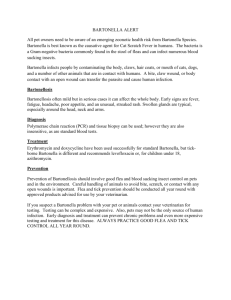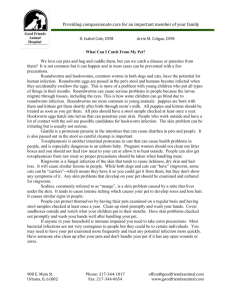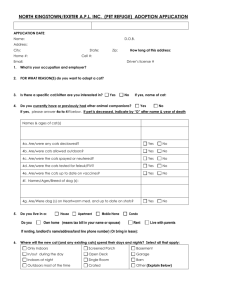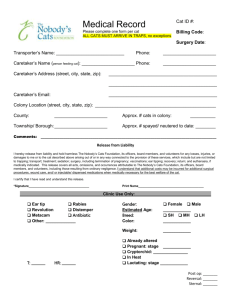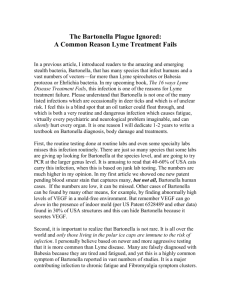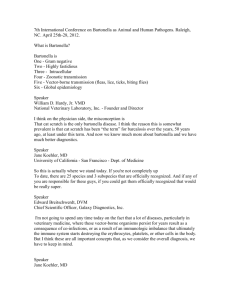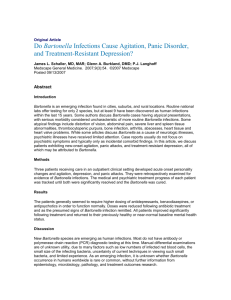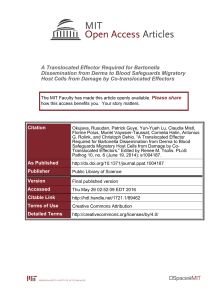Edition 2012 - Plantation Animal Hospital
advertisement
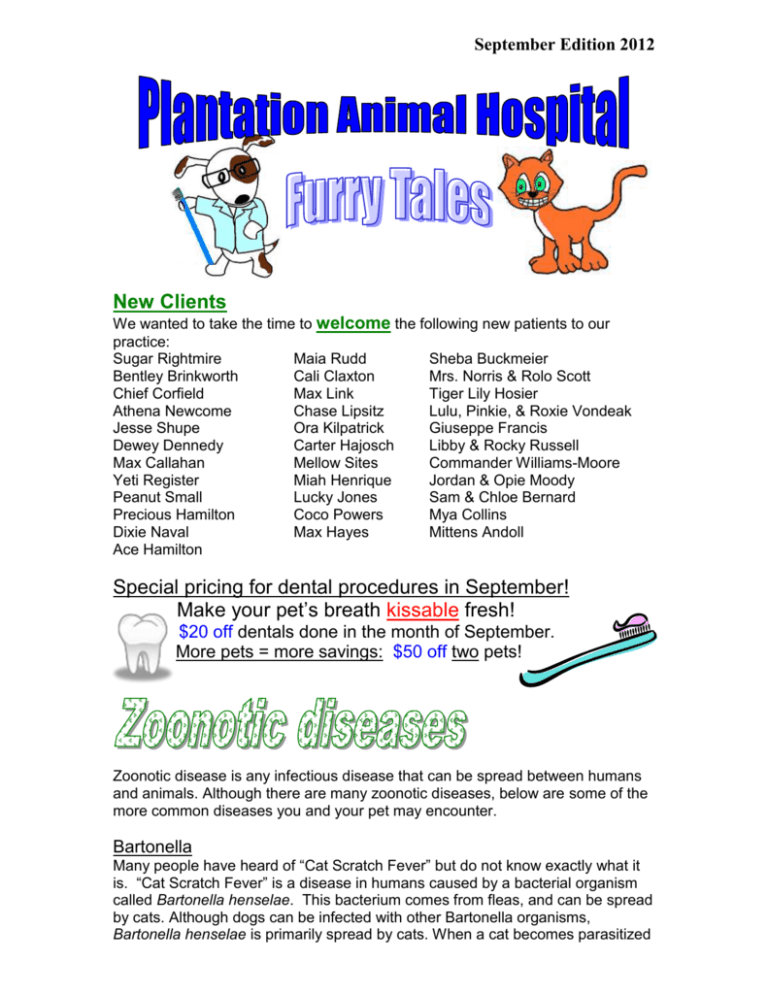
September Edition 2012 New Clients We wanted to take the time to welcome the following new patients to our practice: Sugar Rightmire Maia Rudd Sheba Buckmeier Bentley Brinkworth Cali Claxton Mrs. Norris & Rolo Scott Chief Corfield Max Link Tiger Lily Hosier Athena Newcome Chase Lipsitz Lulu, Pinkie, & Roxie Vondeak Jesse Shupe Ora Kilpatrick Giuseppe Francis Dewey Dennedy Carter Hajosch Libby & Rocky Russell Max Callahan Mellow Sites Commander Williams-Moore Yeti Register Miah Henrique Jordan & Opie Moody Peanut Small Lucky Jones Sam & Chloe Bernard Precious Hamilton Coco Powers Mya Collins Dixie Naval Max Hayes Mittens Andoll Ace Hamilton Special pricing for dental procedures in September! Make your pet’s breath kissable fresh! $20 off dentals done in the month of September. More pets = more savings: $50 off two pets! Zoonotic disease is any infectious disease that can be spread between humans and animals. Although there are many zoonotic diseases, below are some of the more common diseases you and your pet may encounter. Bartonella Many people have heard of “Cat Scratch Fever” but do not know exactly what it is. “Cat Scratch Fever” is a disease in humans caused by a bacterial organism called Bartonella henselae. This bacterium comes from fleas, and can be spread by cats. Although dogs can be infected with other Bartonella organisms, Bartonella henselae is primarily spread by cats. When a cat becomes parasitized with fleas, the flea leaves behind “flea dirt” (flea poop) on the cat’s skin which has the bacteria in it. Cats will commonly get flea dirt in their nails as they scratch at the fleas. Once this dirt is in the nails, a single scratch can transmit Bartonella to a person. Bartonella infection can cause red bumps, enlarged lymph nodes, and fever. In normal people, the infection is usually cleared from the immune system within a few weeks. In children, older people, or those who are immune compromised, Bartonella infection can be much more serious, and if left untreated, even fatal. Bartonella also has the potential to make cats sick. There has been evidence to suggest that Bartonella may play a role in a painful oral condition in cats called “stomatitis.” The good news is that a blood test is available to see if your cat is at risk of harboring Bartonella. If a high level of infection is detected, a three week course of antibiotics can be used to help the cat clear infection. The best means of preventing Bartonella is to keep your cat free from fleas. Leptosporosis Leptosporosis is a bacterial disease caused by leptospires bacteria. This bacterium can infect wild animals, domestic pets, and humans. Although all animals can be infected, cases of leptospirosis in cats are rare. Infected animals shed the bacteria in their urine. It then gets into standing water and soil where it can live for weeks to months at a time. Animals and people come in contact with leptosporosis by drinking, swimming, or walking through contaminated water/soil. Pets that live around standing water or in areas with a lot of wildlife are at increased risk of encountering infection. Signs of infection can be nonspecific at first and can include; fever, vomiting, abdominal pain, diarrhea, inappetance, weakness and depression, stiffness and muscle pain. More severely the infection can get into major organs (kidneys, liver, etc.) and cause life threatening illness. Although leptosporosis can be treated with antibiotics, the disease can be very serious and require hospitalization and supportive care. Any at-risk dogs should be vaccinated for leptosporisis. In addition, care should be taken to avoid human contact with animal urine especially in warm, moist environments areas where wildlife frequent. Toxoplasmosis There has been a lot of discussion in the media lately about a “brain disease that cats carry.” This disease is the protozoal parasite Toxoplasma gondii. There are two forms of Toxoplasma gondii. One is the oocyts (eggs) that domestic cats shed and the other is the tissue cyst that can be found in raw/undercooked meat and unpasteurized dairy products. Most serious cases in humans come from consuming undercooked/raw animal products rather than exposure to cats. Cats that have the parasite may have diarrhea, or may be asymptomatic. Once infected, they shed the oocysts in the stool for a limited window of time. This shedding normally only occurs the first time a cat is infected and lasts about 1-2 weeks. It takes around 2 days for these oocysts to become infective to people, so human risk is minimized when litter boxes are cleaned daily. In most human cases the disease mimics a cold and can cause fever, malaise and swollen lymph nodes. However, the disease can most notably be a risk to pregnant women, as the parasite can cross the placenta and infect unborn babies. People with compromised immune symptoms are at risk for more serious cases if infected. Rabies Rabies is a rhabdovirus which is a serious disease that can infect mammals. Wildlife is the most common reservoir of the virus, particularly raccoons, bats, coyotes, skunks, and foxes. Rabies causes serious damage to the nervous tissue and the brain that result in neurologic disease and death. Vaccination of domestic animals has been the best means of preventing risk to humans. Any person who is bitten by a wild animal or unvaccinated animal should seek immediate attention from a physician. It is very important to keep pets current on their Rabies vaccine to safeguard humans from this fatal disease. Ringworm Despite its name, ringworm is a term used to describe the skin infection caused by a certain group of fungi (dermatophytes) and is not caused by a worm at all. The name comes from the characteristic ring appearance seen in infected humans. In animals, ringworm often looks like a dry, scaly patch of hair loss. Some types of ringworm can be identified with a black light, but most of the time a fungal culture is necessary to diagnose it. The fungal spores that cause ringworm can live in the soil for long periods of time. Animals encounter them from infected soil or a contaminated environment. Although any pet can pick up ringworm, it most commonly presents a problem for young animals or immune compromised animals. Ringworm can be treated with oral and topical antifungal treatment, but deep cleaning of the environment is also necessary to prevent reexposure. People who develop suspicious skin lesions after exposure to an animal with ringworm should consult a physician for treatment. Intestinal parasites (roundworms, hookworms, tapeworms, giardia) There are a variety of intestinal parasites that animals carry that can pose risk to humans. Some of these parasites are more likely to cause disease in people than others. If your pet is diagnosed with an intestinal parasite, it is best to discuss the human risks with one of our doctors. In order to prevent exposure to intestinal parasites, it is essential to wash your hand thoroughly after contact with animal feces and to keep your pet current on heart worm prevention and routine fecal exams. Heartworm prevention protects your pet against most intestinal parasites. MRSA MRSA (pronounced múr·sa) is an abbreviation for “Methicillin-resistant Staphylococcus aureus.” This bug is a strain of bacteria that has become resistant to common antibiotics. The bacteria can infect almost any tissue, but skin and soft tissue infections are most common. This strain of bacteria has gotten a lot of attention in human medicine, but it can also be carried by pets. MRSA cannot be identified on a microscope— it can only be diagnosed through a bacterial culture and sensitivity test. If MRSA is present in your household, it is possible that your pets may be harboring it, although it is rare that they are the original source of the infection. To be on the safe side, you should always wash your hand thoroughly after contact with animals bodily fluid, saliva or sores. The most important thing to remember is that if you have been in contact with a zoonotic disease, contact your physician to discuss diagnosis and treatment. We are now offering – To the Fleming Island and Green Cove Springs areas. For certain behavioral issues or for those that traveling to the vet is not an option, we can now offer house calls. Please note: certain conditions may require further diagnostic testing to be done at the hospital. If you are interested in learning more, we would be happy to discuss this as an option for you. Please remember to give monthly Heartworm prevention. Plantation Animal Hospital 7165 Highway 17 Fleming Island, FL 32003 www.plantationanimalhospital.net 904-284-0087
